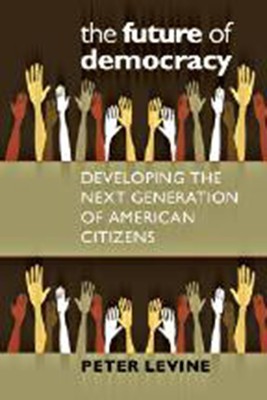
- We will send in 10–14 business days.
- Author: Peter Levine
- Publisher: University Press of New England
- Year: 2015
- Pages: 304
- ISBN-10: 1611687950
- ISBN-13: 9781611687958
- Format: 15.2 x 22.9 x 1.7 cm, minkšti viršeliai
- Language: English
- SAVE -10% with code: EXTRA
Reviews
Description
We need young people to be civically engaged in order to define and address public problems. Their participation is important for democracy, for institutions such as schools, and for young people themselves, who are more likely to succeed in life if they are engaged in their communities. In The Future of Democracy, Peter Levine, scholar and practitioner, sounds the alarm: in recent years, young Americans have become dangerously less engaged. They are tolerant, patriotic, and idealistic, and some have invented such novel and impressive forms of civic engagement, as blogs, "buycott" movements, and transnational youth networks. But most lack the skills and opportunities they need to participate in politics or address public problems. Levine's timely manifesto clearly explains the causes, symptoms, and repercussions of this damaging trend, and, most importantly, the means whereby America can confront and reverse it. Levine demonstrates how to change young people's civic attitudes, skills, and knowledge and, equally importantly, to reform our institutions so that civic engagement is rewarding and effective. We must both prepare citizens for politics and improve politics for citizens.
EXTRA 10 % discount with code: EXTRA
The promotion ends in 23d.00:33:36
The discount code is valid when purchasing from 10 €. Discounts do not stack.
- Author: Peter Levine
- Publisher: University Press of New England
- Year: 2015
- Pages: 304
- ISBN-10: 1611687950
- ISBN-13: 9781611687958
- Format: 15.2 x 22.9 x 1.7 cm, minkšti viršeliai
- Language: English English
We need young people to be civically engaged in order to define and address public problems. Their participation is important for democracy, for institutions such as schools, and for young people themselves, who are more likely to succeed in life if they are engaged in their communities. In The Future of Democracy, Peter Levine, scholar and practitioner, sounds the alarm: in recent years, young Americans have become dangerously less engaged. They are tolerant, patriotic, and idealistic, and some have invented such novel and impressive forms of civic engagement, as blogs, "buycott" movements, and transnational youth networks. But most lack the skills and opportunities they need to participate in politics or address public problems. Levine's timely manifesto clearly explains the causes, symptoms, and repercussions of this damaging trend, and, most importantly, the means whereby America can confront and reverse it. Levine demonstrates how to change young people's civic attitudes, skills, and knowledge and, equally importantly, to reform our institutions so that civic engagement is rewarding and effective. We must both prepare citizens for politics and improve politics for citizens.


Reviews